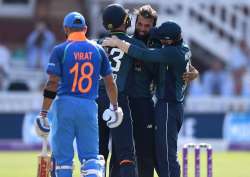Virat Kohli's wicket was the turning point, says Yuzvendra Chahal after loss at Lord's
Chahal felt that unlike England innings when there wasn't much assistance for slow bowlers, the Lord's track helped home team spinners Rashid and Ali.

After suffering a comprehensive 86-run defeat in the second ODI at Lord's on Saturday, India leg-spinner Yuzvendra Chahal said the wicket of skipper Virat Kohli was the turning point of the match and England took the control thereafter.
"I think the turning point was the wicket of Virat Kohli because a good partnership was going on. When you chase 322, you need wickets in the end. I also think their spinners bowled well," Chahal said at the post-match press conference.
The day belonged to the English spinners Adil Rashid and Moeen Ali, who shared three wickets for 80 runs in 20 overs between them.
"The way Moeen started, the boundaries weren't coming. We could only get one or two runs and the asking rate was climbing, so there was pressure on the batsmen. You can say their spinners bowled well in the middle overs," he said.
Chahal felt that unlike England innings when there wasn't much assistance for slow bowlers, the Lord's track helped home team spinners Rashid and Ali.
The hosts scored 322/7 after Joe Root scored his 12th ODI hundred after recovering from 239/6 at one stage. In reply, India were all-out for 236 in 50 overs.
"I think as a team, we conceded 20-25 runs too many at the death. But the credit should go to Willey and Root too because they batted so well in the end. It was a different, slow pitch. If you bowled slow, the batsmen were able to play it easily. When we bowled, there wasn't as much turn as there was in the second innings.
While Kuldeep Yadav (3/68) provided the breakthroughs, Chahal bowled a tight seven-over spell before the 40th over before Willey-Root broke free.
"When I bowled a couple of overs, I found it to be a bit slow. So I decided to vary my pace on it and keep bowling full because it is a slow wicket, there are more chances of going for runs with short-pitched bowling. So I wanted to keep it wicket-to-wicket, because if the batsman misses, I have chances of taking wickets," he explained his strategy.
(With PTI inputs)